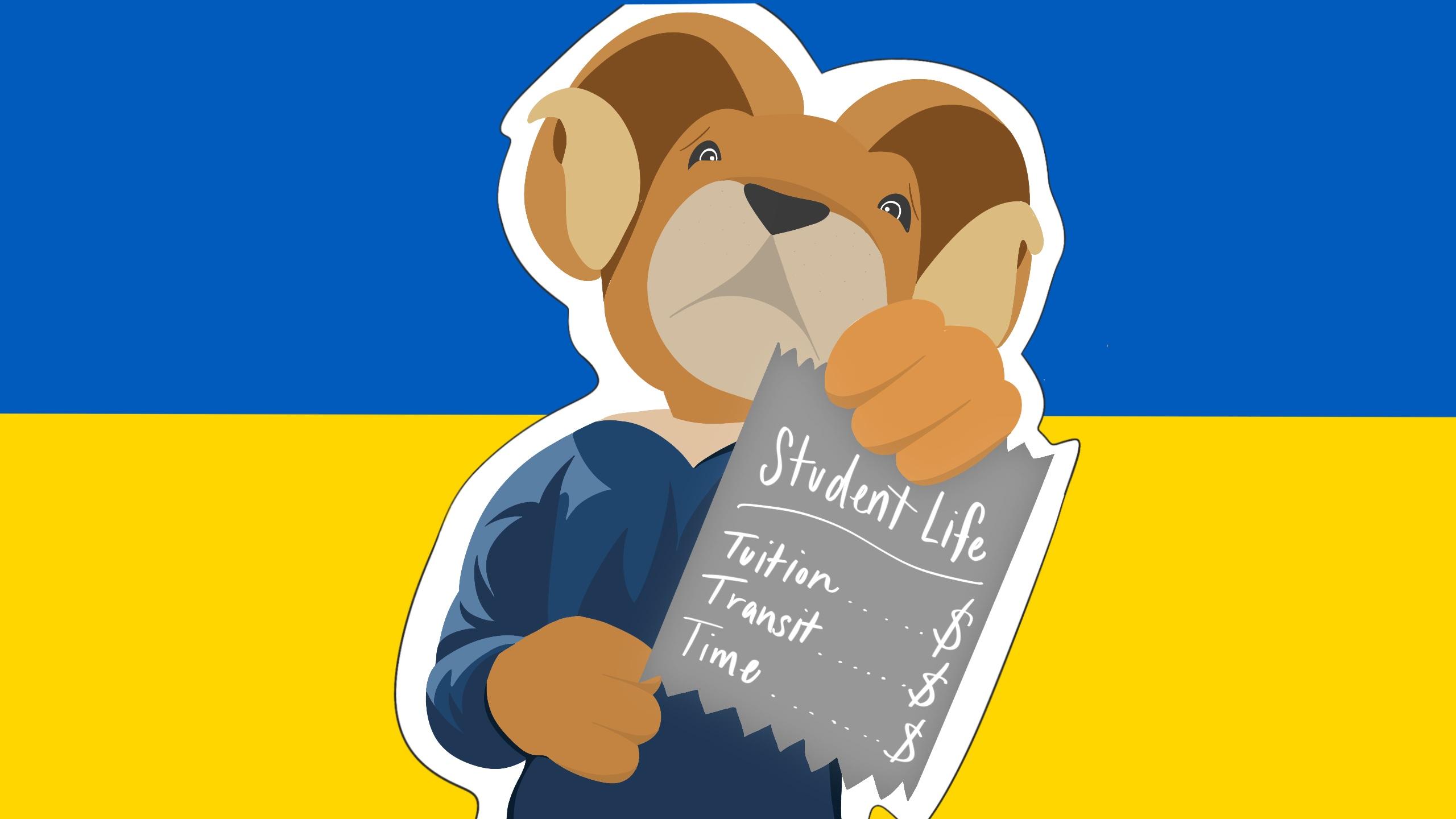By Madison Schuliakewich
Academics of Ukrainian descent and allies of Ukrainians called for Ryerson to provide aid for Ukrainian international students in a letter sent to Ryerson president Mohamed Lachemi, provost Jennifer Simpson and the board of directors this past Friday.
“We are writing to request a robust response to support displaced Ukrainian scholars in the form of funding for scholarships, fast-tracking student and faculty exchange agreements with Ukrainian universities, participation in already-existing scholarships, lowered or free tuition fees, and travel or settlement support for Ukrainian scholars fleeing this brutal war,” the letter reads.
Marusya Bociurkiw, a media theory professor at Ryerson, said Ukraine is home to over 800 post-secondary institutions; all of which have been shut down as a result of Russian president Vladimir Putin’s war on Ukraine.
“Ukraine is a really smart country,” said Bociurkiw. “I’m always blown away by the depth and precision of scholarship currently coming out of Ukraine.”
“Six weeks into the war, nothing has been done by my university to help scholars from Ukraine. That hurts”
Marusya said the Russian army is intentionally targeting the culture and intellectual life of Ukraine, meaning scholars are even more at risk now—Ukrainian speakers; women; feminists; LGBTQ+ scholars; and activists will be among the first to be targeted.
“We see them as part of our community. We don’t see this as a charity case, we see this as part of our knowledge network; we want to support that and preserve it,” said Bociurkiw.
Bociurkiw has been a researcher and professor at the RTA School of Media for 15 years. As a Canadian-Ukrainian, she said she is disappointed that Ryerson has offered her and her colleagues nothing but what she called “vague email responses.”
“Six weeks into the war, nothing has been done by my university to help scholars from Ukraine. That hurts,” she added.
“My hope is that X University, rather than trying to wait us out, will do the right thing and commit actual funding to support the network of brilliant displaced students from Ukraine.”
In an interview with The Eyeopener on March 7, Lachemi said Ryerson currently has 27 students from Ukraine and 53 students from Russia.
“These students are valuable members of our community and the university has proactively reached out to each of them to offer support and services,” he said. “We will continue to support them as needed through this difficult time.”
He added that the school is also offering application fee vouchers for international students.
“This is because a number of Russian international students and prospective international students have been unable to process fee payments for applications and tuition due to sanctions levied against Russia.”
Universities all over the world are making commitments to help support Ukrainian students in their continuing educational journeys, many of which are in Canada.
The University of Toronto (U of T) has committed to invest in its Scholars-at-Risk fund, matching all donations up to one million dollars, providing aid to displaced students and current students at U of T.
“I think for the moment, the top bureaucrats and presidents of Russian universities are breaking academic conduct with their clear and explicit support of Putin’s war against Ukraine“
“Russia’s war on Ukraine and needless suffering of civilians, including many students who have been forced to abandon their educational careers, requires immediate support from the global community and institutions like U of T,” said David Palmer, the vice-president of advancement at U of T.
“These bursaries will be an essential lifeline for students from Ukraine who wish to continue their studies and rebuild their lives,” said Palmer.
Department of Physics professor Alexandre (Sasha) Douplik, said he has personally dealt with the effects of the war on Ukraine.
Douplik, who spent some of his childhood in Kyiv, recently evacuated his mother from the country.
Despite having both Russian and Ukrainian friends and colleagues from years of learning amongst both sets of peers, Douplik said he noticed that in the past eight years, propaganda has influenced a lot of them to believe that the war is good.
“They speak about Ukraine almost 24/7 for years, explaining that Ukrainians do not exist; they are Russians,” Douplik said. “If they do not recognize that they are Russians, then they cannot be called normal human beings. They call them Nazis.”
Douplik said this propaganda runs deep, and Russian educational institutions are now “poisoning the academic environment.”
“I think for the moment, the top bureaucrats and presidents of Russian universities are breaking academic conduct with their clear and explicit support of Putin’s war against Ukraine”
On March 4, a letter was signed by hundreds of presidents from Russian universities expressing their full support for the war.
“This implies that the professors and students are supposed to support this word,” Douplik added. “I think for the moment, the top bureaucrats and presidents of Russian universities are breaking academic conduct with their clear and explicit support of Putin’s war against Ukraine.”
Bociurjiw said they are also seeking fundraising support.
“I think sites like the alumni organization can help to fundraise,” said Bociurkiw. “They fundraise all the time for the university and they are quite professional at it. So, sites of the university that are adept at fundraising can also contribute.”










Leave a Reply